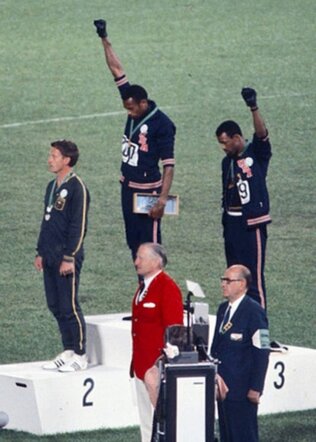|
by Ryan Tibbens
Over the last couple weeks, I've watched and listened to sports commentators, political analysts, comedians, athletes, politicians, keyboard warriors, and, well, it seems like almost everyone, argue about Colin Kaepernick and the recent national anthem protests. I've chimed in a few times, but mostly I've stayed out of it. In the last three days, I've been directly asked five times what I think. It's a little lengthy, but here's why you should be fine with the protests. I think the protests are fine. I stand for the national anthem and for the Pledge of Allegiance. I'm not offended if others don't. It's a free country. If you love the freedom of expression, it means that you love it even when it is exercised in ways you don't agree with or by people you don't like. I believe there are certain things people usually shouldn't say, but I don't suggest we legislate the language, and I don't think there should be public outrage or persecution as long as the statements are nonviolent. Sometimes I hear things I don't like, and I just let them go. This protest hurts no one, so if you disagree, the smart move is to let it go.
I recently saw a friend, a fellow teacher, post about his disagreement with and disgust for the anthem protests. He claimed that he was upset about the form of the protest, his perceived disrespect to our flag and nation and soldiers and all that, but that he was fine with players' desires for greater racial equality. I asked him what he does when students don't stand for the Pledge of Allegiance in school. I asked if their decision not to stand skewed his opinion of the students. He said he does nothing and that he is not biased against them. He said that his opinion of them is unaffected because he doesn't know their reasons. So, despite his claims, his disgust must be based, at least in part, on the protest's motives, not acts, because those same displays are tolerable from other people at other times. I suspect that most people who complain about the sitting or kneeling hold the same bias, at least subconsciously.
I've also noticed that many people complaining about the protests are hypocrites. Not everyone, but many people. Most of my friends who disagree with the protests are also those who claim to hate political correctness. They say people should toughen up and get over it; they say life isn't always fair. Political correctness is about adjusting your words and actions so as to avoid insulting or disrespecting other groups of people. But these same complainers say they feel insulted or that soldiers may feel disrespected or that veterans are hurt by these acts. If it's okay to offend some people sometimes, then it's okay to offend other people other times. You can't have it both ways. How about the fact that nearly all of my friends who support displays of the Confederate battle flag also strongly oppose Kaepernick's protest? They say they support the first amendment right to fly a flag and that they want to celebrate their heritage and that it was their ancestors' right to rebel and secede. They are defending a flag and a group of predominantly white people who took up arms against the United States of America in hopes of maintaining the institution of racial slavery. If the Confederacy's bloody resistance was just, then how is Kaepernick's quiet and peaceful protest unjust? If it is okay for someone to fly the Confederate flag, regardless of how it may make neighbors feel, then how is it so upsetting for a football player to choose to kneel during a song? These same hypocrites say they are sick of people complaining about Confederate flags, sick of people championing political correctness and limiting their freedoms. You can't have it both ways. White people complain about race riots. White people complain about civil rights parades. White people complain about traffic stoppages. Now, a low-level celebrity (catapulted to greater fame by this "controversy") is the subject of white complaint because he quietly, respectfully, and purposefully chose not to stand during the national anthem. Many people may disagree with my assertion that this protest is respectful, but consider that these football players are not interrupting the anthem: they're not shouting, cussing, spitting, rolling around, fighting, running, trampling flags. Nothing. They're just not standing. In fact, they are kneeling: a gesture that, in nearly every other setting, is considered an act of reverence. And suddenly this is an outrage. I suspect if Tim Tebow had knelt to pray during the national anthem, many white, Christian Americans would have cheered. While our country has come a long way in terms of human and civil rights for all people, we still have a long way to go. Compare poverty, education, healthcare, employment, home ownership, incarceration, average pay, or nearly any other aspect of quality of life -- you will find disparities, often large gaps, between racial groups in the United States. You will also find them between the sexes, but that's a different protest I suppose. These men are not wrong about their cause; their complaint is reasonable and worth discussing. So if the protest isn't really intrusive or abusive, and if the cause is just, how can we be upset about it? It's fine to say you would do it differently, but I don't think it makes sense to accuse them of wrongdoing. White people used to complain about black people at their dining counters or in their bus seats or in their schools. Maybe we should quit complaining when other people want to talk about inequality.
0 Comments
|
Read.Think.Write.Speak.Because no one else Archives
December 2021
Categories
All
|


 RSS Feed
RSS Feed